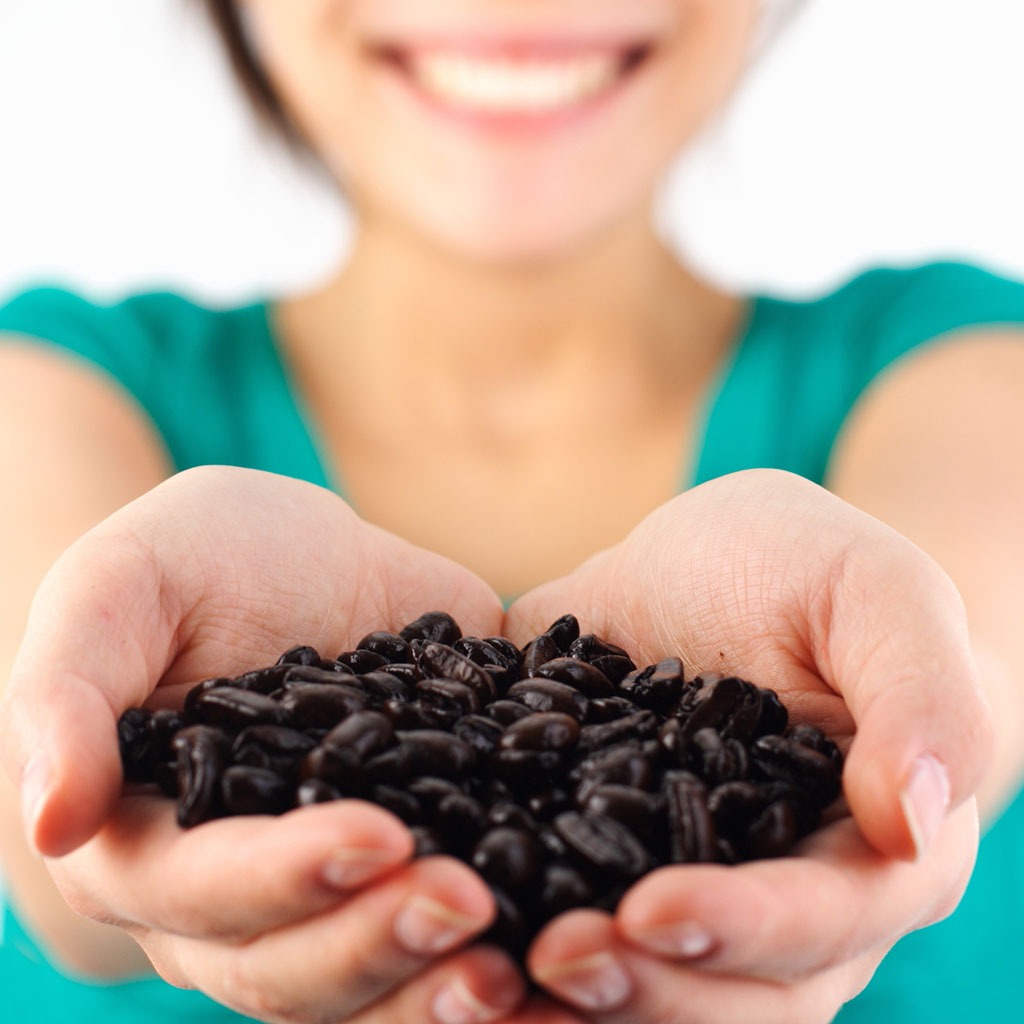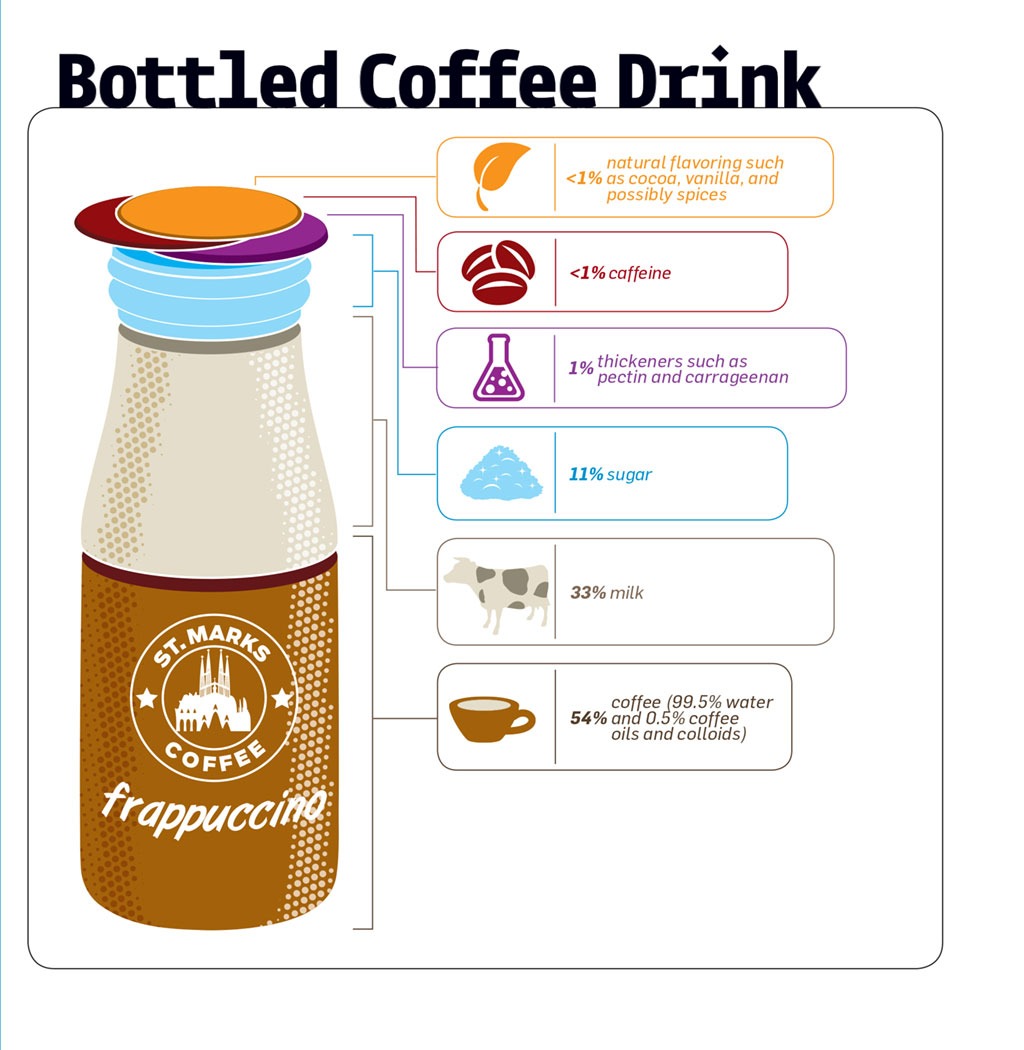What's Really in Your…Bottled Coffee Drink

It's a hot afternoon, you're feeling bedraggled by work, and you crave the fast pick-me-up of a cold coffee drink. One option: Stand in line at Starbucks, working your way through a confusing menu only to wrap your tongue around twisted titles like "Venti Java Chip Frappuccino with 2% hold the whipped." Or, you can just reach into the refrigerator section, grab a cold bottle of premade java, and go.
But what's actually in that bottle? A lot less coffee, and a lot more stuff, than you might think. In fact, about half of your bottled drink is comprised of sweeteners, preservatives, thickeners, and of course milk. And that means that what you're getting for your money is a lot less pick-me-up, and a lot more let-me-down.
The research team at Eat This, Not That! magazine took a typical 9.5 fl. oz. bottle into our food lab to determine exactly what's inside. Read on to see the percentage-by-percentage breakdown—and then learn more astonishing truths about the food industry in our special report: 24 Ways the Food Industry Is Making You Fat—Exposed!
<1% Natural Flavoring Such as Cocoa, Vanilla, and Possibly Spices
This could be any of the ingredients we just listed—or none of them. The bottled beverage companies keep their exact formulas secret, and the FDA makes no serious effort to control the use of the word "natural" on nutrition labels. Case in point: a JavaPro coffee drink boasts that it's made with "Natural Flavors" when, in fact, it's also got the artificial sweetener sucralose.
<1% Caffeine
If you're buying a bottle of coffee for the slap-me-awake powers of caffeine, you're not getting your money's worth. In fact, a Starbucks Frappuccino Coffee Drink has about 76 mg of caffeine, less than half of what you'd get from a grande Caffe Mocha—even a bottle of Mountain Dew has more of the jitter juice. For a more effective way to wake up, eat your caffeine with these 10 Amazing Foods With More Caffeine Than Coffee!
1% Thickeners Such as Pectin and Carrageenan
Pectin is a natural fruit fiber. What's so bad about a natural fiber? Well, just as it causes the ingredients here to stick together, pectin also sticks to health-boosting antioxidants like beta-carotene, lycopene and lutein, carrying them out of your system before your body can benefit from them. Meanwhile, carrageenan, a binding agent derived from seaweed, has been shown in animal studies to cause ulcers, colon inflammation, and digestive cancers. While these results seem limited to degraded carrageenan—a class that has been treated with chemicals and heat—a University of Iowa study concluded that even undegraded carrageenan could become degraded in the human digestive system. No wonder it's one of these 8 Ingredients You Never Want to See on Your Nutrition Label!
11% Sugar
Once you put the contents of your coffee into the hands of product packagers, you lose control of what you're drinking. And that means the sugar content of your drink is up to someone else to decide. Gevalia Mocha Iced Coffee with Almond Milk packs 24 grams of sugar—that's six teaspoons' worth, or the equivalent of about a dozen Jolly Ranchers.
33% Milk
Nothing bad here. We're big believers that milk can be great for some diets—it's high in protein, good for blood pressure, and an excellent source of Vitamin D and bone-friendly calcium. But we've also seen that cutting down on milk can result in a reduction in waist size for some people, as your gut becomes less bloated and your belly flattens out rapidly. One meta-analysis published in The Journal of Clinical Nutrition, which reviewed nearly 30 studies, found that results don't "…support the beneficial effect of increasing dairy consumption on body weight and fat loss." In fact, one study of more than 12,000 kids found that the more milk they consumed, the more weight they gained. Click here to discover the 7 Amazing Things That Happen to Your Body When You Give Up Milk!
54% Coffee (99.5% Water and 0.5% Coffee Oils and Colloids)
Coffee is one of the best weight-loss foods out there—if you drink it right. A study published in the journal Physiology and Behavior found that the average metabolic rate of people who drank caffeinated coffee was 16 percent higher than those who drank decaf. Other studies have found that caffeinated coffee can rev your metabolism to burn as many as 174 additional calories a day. (That's the equivalent of burning off a pound and a half of flab every 20 days!) Guess what undoes all that good news? All the added sugar in this bottle. To burn fat quicker, drink tea. Green tea is a proven fat-blaster, and we've included it in our best-selling diet plan (on which test panelists lost 10 pounds in one week): The 7-Day Flat-Belly Tea Cleanse!
FOR A NEW FRUIT THAT TASTES LIKE CHOCOLATE PUDDING
—and 20 other weight-loss superfoods you've never heard of—CLICK HERE!








